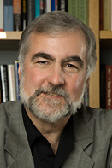Difference between revisions of "William Schulz"
(New page: '''William F. Schulz''', was the executive director of Amnesty International (USA) from 1994 until 2006, and since then has been a Fellow at the Carr Center-Harvard Univ. [[Image:Wil...) |
(No difference)
|
Latest revision as of 13:05, 1 May 2009
William F. Schulz, was the executive director of Amnesty International (USA) from 1994 until 2006, and since then has been a Fellow at the Carr Center-Harvard Univ.
An ordained Unitarian Universalist minister, he came to Amnesty after serving 15 years with the Unitarian Universalist Association of Congregations, the last eight (1985-93) as president. From 1985-93, he also served on the Council of the International Association for Religious Freedom, the oldest international interfaith organization in the world. Throughout his career, he has been outspoken in his opposition to the death penalty and his support for women's rights, gay and lesbian rights, and racial justice, having organized, participated in demonstrations, and written extensively on behalf of all four causes.
Schulz is a member of the International Advisory Committee for the Robert F. Kennedy Human Rights Award and is chair of the board of Meadville/Lombard Theological School at the University of Chicago. He has served on the boards of People for the American Way, Planned Parenthood Federation of America, the Communitarian Network, and Americans United for the Separation of Church and State, among others.
Schulz is a Phi Beta Kappa graduate of Oberlin College and holds a M.A. in philosophy from the University of Chicago, a M.A. in theology, and the Doctor of Ministry (D.Min.) from Meadville/Lombard Theological School. He was awarded an honorary D.D. from Meadville/Lombard in 1987 and an honorary L.H.D. from Nova Southeastern University in 1995.[1]
Episodes
- In 1999, Schulz quietly accepted the humanitarian bombing of Serbia. AI's releases afterwards didn't oppose the U.S. State Dept.'s controverted justifications for the campaign against Serbia.[2]
- In 2004, Schulz went on record suggesting that the observance of human rights should be amended due to the "war on terror". Although his NYT editorial didn't go into details as to what he really was suggesting, there are now several "human rights" think-tanks working on an amended concept of human rights. The Carr Center where Schulz is currently a Fellow has several individuals working on just such a notion.[3]
Affiliations
- Amnesty International exec. director 1994-2006.
- Carr Center for Human Rights Policy, Fellow 2006/2007
- Center for American Progress – Senior Fellow [4]
Books & aritcles
- In Our Own Best Interest: How Defending Human Rights Benefits Us All (Beacon Press, 2001)
- W. Schulz, Security Is a Human Right, Too, New York Times, 18 April 2004. Typical rendition of AI human rights mantra, but now suggesting that this has to be tempered during the "war on terrorism". Curious aspect of Schulz argument has to do with the unwillingness to look at the cause of "terrorism".
- William F. Schulz (Editor), The Phenomenon of Torture: Readings and Commentary, Pennsylvania Studies in Human Rights series, 2007, ISBN 978-0-8122-1982-1
Notes
- ↑ Carr Center's biography; Accessed 11 November 2008. NB: the biography has been abridged from the previous version on which the above paragraphs are based.
- ↑ Alexander Cockburn, How the US State Dept. Recruited Human Rights Groups to Cheer On the Bombing Raids: Those Incubator Babies, Once More?, CounterPunch Newsletter, April 1999. Copy of relevant passage here: Koh Selling Humanitarian Bombing
- ↑ W. Schulz, Security Is a Human Right, Too, New York Times, 18 April 2004.
- ↑ NYU profile, Accessed: 11 November 2008.
